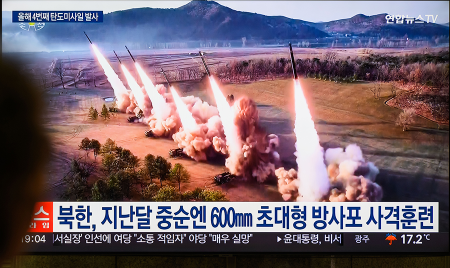"In my home there are few publications that we actually get hard copies of, but [Arms Control Today] is one and it's the only one my husband and I fight over who gets to read it first."
North Korea Pledges Nuclear Buildup
June 2024
By Kelsey Davenport
North Korea is continuing to test new military systems and pledging to build up its nuclear arsenal further in response to U.S. and South Korean activities.

On May 18, North Korea said it tested a new ballistic missile with an “autonomous navigation system.” The state-run Korean Central News Agency (KCNA) said the test verified the “accuracy and reliability” of the new navigation system.
On the same day, North Korean leader Kim Jong Un visited a military production facility and expressed “great satisfaction” with the work being done in “bolstering up” the “nuclear war deterrent of the country.” According to KCNA, he stressed the importance of accelerating certain production activities to further expand North Korea’s nuclear forces.
These new capabilities are driving South Korea to prepare to respond to large-scale aerial attacks from North Korea. Seoul held a drill focused on repelling North Korean projectiles, including ballistic missiles and cruise missiles. In a May 14 press release, South Korean Air Force Lt. Gen. Kim Hyung-soo said that recent conflicts overseas demonstrate that initial responses to “large-scale aerial provocations determine the success or failure of the war.”
North Korea continues to justify expanding its nuclear arsenal as necessary to respond to what it says are security dynamics and hostile U.S. policy toward Pyongyang. Pyongyang reiterated that it would expand its arsenal after Washington conducted a subcritical nuclear test in May.
In a May 20 report, KCNA described the U.S. test as a “dangerous act” and said Washington has “revealed” that its strategic goal is to “militarily control other countries with the unchallenged nuclear edge.”
The test has added “new tension” to the security situation on the Korean peninsula, the statement said. North Korea will not tolerate a “strategic imbalance” on the Korean peninsula and will reconsider its deterrence posture in response, the statement said.
In addition to showcasing new systems, North Korea conducted a military exercise designed to test the country’s preparedness for a nuclear counterattack.
According to KCNA, North Korea on April 22 tested its “nuclear trigger” command-and-control system for the first time. This system enables Pyongyang to switch rocket launchers from conventionally armed shells to nuclear armed shells. This capability “substantially” strengthens North Korea’s “prompt counterattack capacity.” The test also provided an opportunity to reexamine the “reliability of the system of command, management, control, and operation of the whole nuclear weapons forces.”
KCNA reported that rocket launchers used in the drill accurately struck their targets and that Kim expressed “great satisfaction” with the drill and noted that plans to build up the country’s nuclear forces have been “translated into reality.”
North Korea is compelled to “more overwhelmingly and more rapidly bolster up its strongest military muscle” in response to the “ceaseless military provocations” from “hostile forces,” KCNA said.
Specifically, the statement condemned recent South Korean-U.S. joint airborne exercises held in April, which KCNA described as “extremely provocative and aggressive.”
The United States continues to defend the necessity of joint military exercises. Daniel Kritenbrink, assistant secretary of state for East Asian and Pacific affairs, said on May 14 at the Brookings Institution that the United States has no choice but to “double down” on military cooperation with South Korea and Japan in response to North Korea’s military developments and rejection of U.S. calls for dialogue. He said U.S. cooperation with regional allies has “reached unprecedented levels” to counter the growing threat from North Korea.
Kritenbrink also referenced the importance of enforcing sanctions against North Korea, saying that the United States is left with “no choice but to focus on these harder elements of our strategy.”
As part of the U.S. sanctions strategy, Japan, South Korea, and the United States coordinated a joint statement endorsed by 50 states condemning Russia’s veto in the UN Security Council of a resolution that would have extended the panel of experts charged with assessing the implementation of UN sanctions on North Korea. (See ACT, May 2024.) The panel’s mandate officially ended April 30.
The statement said it is “imperative” for UN member states to comply with Security Council resolutions and that states “must now consider how to continue access to this kind of objective, independent analysis in order to address [North Korea’s] unlawful [weapons of mass destruction] and ballistic missile advancements.”
North Korea responded to the statement by saying that any efforts to reestablish a panel of experts is “bound to meet self-destruction with the passage of time.” In a May 5 statement, Kim Song, North Korea’s representative to the United Nations, said that the panel of experts and the UN sanctions regime is a “tool for the hegemonic policy” of the United States.
